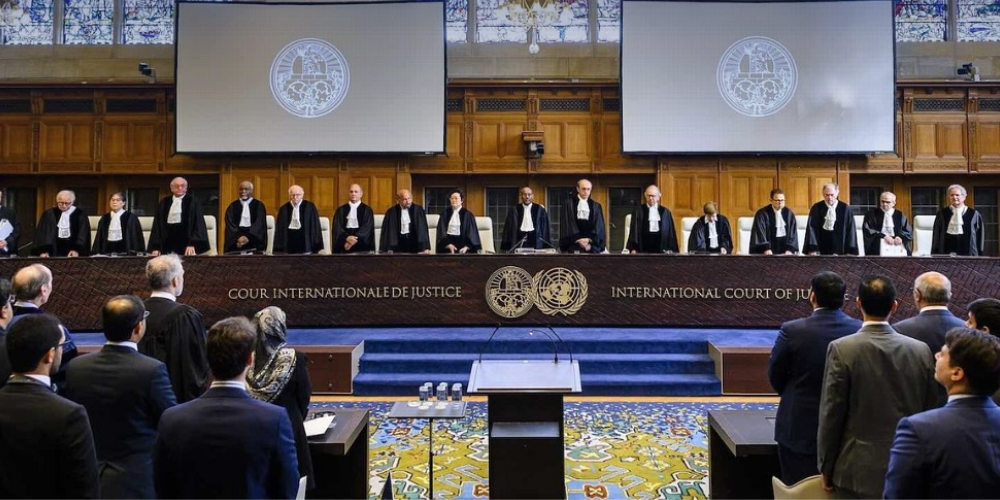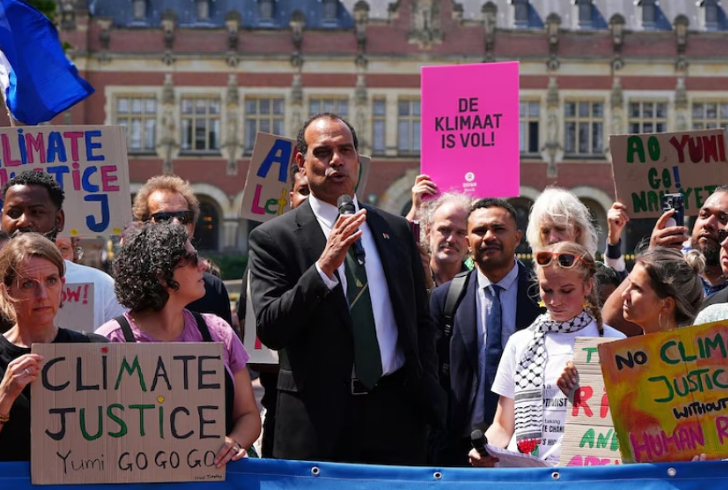
World Court Declares Climate Action a Legal Duty for All Nations

July 23, 2025, will sit in climate law’s calendar like a bookmark you can’t ignore. On that day, the International Court of Justice did more than issue an advisory opinion—it threw down a marker.
For the first time, the planet’s highest legal authority said, in no uncertain terms, that nations have a binding duty to protect the Earth from their own emissions. Fail to do so, and you’re not just negligent—you could owe reparations. The ruling didn’t whisper its significance; it cracked the door open to future claims for ecological restoration, financial compensation, and hard accountability.
Law, Not Just Politics
This wasn’t a diplomatic mood piece masquerading as law. The ICJ grounded its opinion in a lattice of treaties—the UNFCCC, Paris Agreement, UNCLOS, biodiversity conventions—woven together with strands of customary international law.

Instagram | drsophie4mackellar | States failing to limit emissions could face legal liability for harm caused, even indirectly.
The Court leaned on principles many leaders like to quote but rarely enforce: the duty to prevent cross-border environmental harm, and the moral architecture of intergenerational justice. The novelty wasn’t the paper trail of agreements; it was the Court saying that inaction itself—whether or not a treaty spells it out—can constitute a wrongful act under international law.
Vanuatu’s Long Game
If this sounds sudden, it’s anything but. The case traces back to a quiet campaign by small island states, with Vanuatu steering the wheel and Pacific student activists supplying the engine.
Their strategy was slow, deliberate, and almost diplomatic judo—leveraging the UN General Assembly’s 2023 referral to put the question where it could no longer be dodged. Big emitters argued they’d already done “enough.” The Court politely disagreed. In essence: You’re still legally responsible, and your promises don’t erase the damage.
One Planet, One Obligation
The opinion goes further than some expected: it frames a clean, healthy environment as a human right, tethered to survival needs like health, housing, food, and life itself. Climate destabilization, the Court said, undermines these rights—and not just for today’s citizens. Future generations have standing in this equation. The subtext was clear: legal obligations don’t expire when election cycles do.

Instagram | international_law_page | ICJ judges issued individual declarations, revealing evolving legal views on climate change.
From Advisory to Action
Yes, it’s “advisory”—technically non-binding—but that doesn’t make it toothless. In courtrooms from The Hague to Washington, this opinion is already ammunition. Lawyers can now anchor their arguments in the ICJ’s 133-page reasoning, shifting climate litigation from aspirational goals to enforceable duties. In the U.S., where climate fights often play out in state courts, this could tilt the balance in cases that hinge on whether governments are doing “enough.”
The Quiet Revolution
No headlines blared, no red carpets rolled out. This change came the way legal revolutions often do—through meticulous argument, careful diplomacy, and the persistence of nations most at risk of being erased from the map. The ICJ didn’t deliver a Hollywood monologue. It wrote a legal baseline into the record: environmental stewardship is no longer a noble ideal; it’s a legal standard. And sooner rather than later, nations will be judged against it.
More in Legal Advice
-
`
The Rising Trend of Affluent Families Paying Adult Kids’ Bills
The role of wealthy parents in their adult children’s financial lives has become more significant than ever. A new report from...
October 9, 2025 -
`
Beyoncé and Jay-Z Are Considering Buying a 58-Acre Luxury Estate in the Cotswolds
Beyoncé and Jay-Z appear ready to broaden their real estate holdings with a 58-acre estate near Wigginton, tucked within the Cotswolds....
October 1, 2025 -
`
How to Sell Your Bermuda Home the Right Way
Selling a home in Bermuda involves more than listing a property and waiting for buyers. From understanding local regulations to navigating...
September 24, 2025 -
`
Kraft Heinz Announces Major Split Into Two Companies
In a major strategic pivot, Kraft Heinz will split into two public companies. Long regarded as one of the most familiar...
September 17, 2025 -
`
How an Overreliance on Crowdfunding Poses Financial Risks
For countless families, crowdfunding has turned into a lifeline during sudden financial crises. GoFundMe and similar platforms allow loved ones—and even...
September 10, 2025 -
`
Five People Charged in Matthew Perry’s Death – Full Details
The death of Matthew Perry on October 23, 2023, shocked fans worldwide, sparking an investigation that revealed a complex network of...
September 5, 2025 -
`
Here’s Why Every Couple Should Consider a Prenup Before Marriage
Marriage is often seen as a celebration of love, trust, and commitment. But alongside the romance, there’s a practical side that...
August 28, 2025 -
`
PepsiCo Faces Tariffs, Health Trends, and Price Hurdles – Can It Bounce Back?
PepsiCo stands as one of the most influential players in the global snacks and beverages sector, generating nearly $92 billion in...
August 21, 2025 -
`
From “Pretentious” to Legendary | The Harrison Ford Story
Before he was the legendary “Indiana Jones” or the iconic Han Solo, Harrison Ford faced a crossroads that could have changed...
August 13, 2025















You must be logged in to post a comment Login